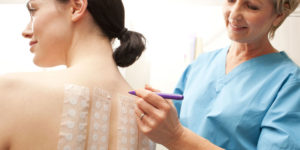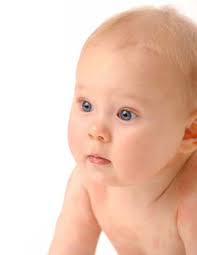Allergy Tests for Eczema
Parents often ask us if their child with eczema is allergic to something in the belief that removing the allergic “cause” would clear

Unfortunately, it is not that simple. It is very rare for childhood eczema to clear after removing or reducing a possible allergen. However, allergies are more common in children with atopic eczema than in other children, so it is helpful for you to think about whether your child might be reacting to something.
Allergies in children with eczema may be:
- Foods – most commonly egg and milk in the first year of life or peanuts in older children
- Things in the air (airborne allergens) eg. grass, animal hair
- Things in contact with the skin (contact allergens) eg plasters, preservatives found in some
creams .
Things that make eczema worse (“flare”) are called “triggers”. Eczema often flares in response to several triggers happening at the same time rather than one at a time.
Triggers may be allergic in nature, but more often than not, they are non-allergic and include irritants, soaps, stress, heat, tiredness, sweating, changes in weather and having a cough or cold. Therefore it is only sometimes that allergy tests help to get better control of your child’s eczema.
In the case of eczema affecting the hands, the most common reason for worsening eczema
The best way to find out if there is something which causes your child’s eczema is to take notice of the reactions your child has. For example, if your child gets itchy patches and swellings on their skin after stroking a cat they do not see often, along with sneezing and a runny nose, then these are fairly reliable signs that your child is allergic to that particular cat.
Food allergies are sometimes harder to spot. If your child gets immediate ‘hives’ or
Remember that atopic eczema is a condition that comes and goes quite quickly and that the best time to look for allergies is when your child’s eczema is in a good and stable state.
Allergy Blood Tests
This blood test tells us if your child has antibodies in the blood which could react to common substances that spark off allergies. Blood tests are helpful to confirm a suspicion of an immediate food or airborne allergy. They can be helpful in babies less than
Just to summarise then: a
Allergy Skin Prick Tests
These are tests that involve pricking a tiny amount of liquid into your child’s forearm to see which ones react. Test liquids are made up out of things that may cause allergies. Drops of these liquids in very dilute form are put on to the arm and the skin is pricked with a tiny needle. If your child is allergic to a particular substance, then they will get a red swelling on their skin after a few minutes. To see a video of this process follow this link: http://www.allergyuk.org/diagnosis–testing-of-allergy/skin-testing
Like the blood test, skin prick tests are only really helpful if they are strongly positive or negative. Skin prick tests cannot be done on skin that is affected by eczema at that time. Anti-histamines must be stopped several days before skin prick tests.
Allergy Patch Tests
These are used to look for another kind of eczema called allergic contact eczema. Sticky patches containing various substances are placed on your child’s back. Contact eczema is very uncommon in babies with atopic eczema, but can occasionally occur in older children. It is much more common in adults. For example, someone may have hand eczema due to wearing rubber gloves as they have an allergy to rubber. The rubber substance will show up as a reaction on their back 2-4 days after placing the patches on. Unlike the positive tests for food and airborne allergens, identifying an allergic contact factor such as rubber, glue, perfume or nickel in
Allergy tests on the High Street
We would not recommend you having high street or internet allergy tests because there is no evidence of their value in the management of atopic eczema.
Final thoughts
If you have any questions about these tests or the information you have
read here, please talk to us at Elan Medical Skin Clinic.
Just remember that allergy tests are only part of the story when assessing your child for possible allergies.





